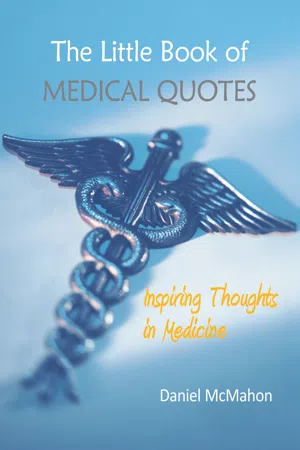
- English
- ePUB (mobile friendly)
- Available on iOS & Android
About This Book
This rich collection of quotations, spanning multiple millennia from the ancient epochs to the contemporary era, is comprised of over five hundred inspirational thoughts and universal ideals enduringly coupled to the art, science, and philosophy of medical practice. These selected quotations encompass a wide breadth of keen observations and aphorisms directly linked to the history, grounding principles, and fundamental theories of medicine and surgery. The quotations in this volume have been drawn from past generations of legendary physicians and intrepid explorers of medical science as well as distinguished anatomists, physiologists, philosophers, writers, artists, and statesmen. The reader will ponder logical precepts, universal truths, and cogent words of guidance from ancient physicians and philosophers such as Hippocrates, Aristotle, and Socrates as well as be offered sage counsel from giants of medical history including Armand Trousseau, Sir William Osler, and Michael DeBakey, among many others. Additionally, the reader will hear the poignant words of world-renowned medical scientists such as Claude Bernard, Jonas Salk, and Marie Curie. There are also enlightening tenets from celebrated Renaissance men, scientists, and innovators including Leonardo da Vinci, Sir Isaac Newton, and Albert Einstein. This unique collection of motivational quotes substantively addresses the pursuit of success in medical practice. Consider these quotations a daily dose of inspiration regardless of the particular discipline or specialty of medicine you have chosen to pursue. These quotations have the capacity to bring into clear focus the fundamentals and principles that are illustrative of sound medical practice, empathetic patient care, and humble professionalism. These thoughts are cognitively stimulating to ponder and at times are refreshingly witty and even humorous. In a medical world that has become overwhelmingly inundated with convoluted electronic health records and complex diagnostic services, these time-tested precepts will convey a modicum of simplicity and brightness upon the complex world in which we practice medicine.
Frequently asked questions
Information
Herman Boerhaave
(1668-1738; Dutch botanist,
chemist, & physician)
Tinsley R. Harrison
(1900-1978; American physician)
Rudolph Virchow
(1821-1902; German physician)
(460 BC-370 BC; Greek physician)
(1849-1919; Canadian physician)
(1827-1912; British surgeon)
(1908-2008; American cardiovascular surgeon)
by his nom de plume, Voltaire
(1694-1778; French writer & philosopher)
(1919-2012; American surgeon)
(1821-1902; German physician)
(1841-1905; German physician)
(1900-1978; American physician)
(1849-1919; Canadian physician...
Table of contents
- Cover
- Title Page
- Copyright Page
- Contents
- Introduction
- About the author
- Dedication
- PART I THE PRACTICE OF PHYSICK
- PART II PILLARS OF TIMELESS WISDOM FOR CLINICAL PRACTICE
- PART III PHILOSOPHIC INSPIRATION & WORDS TO LIVE BY
- PART IV THE ROAD AHEAD
- AFTERWORD
- Back Cover